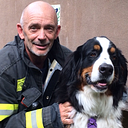Casper and the Coyotes
When coyotes are in the national news, it’s usually not good. This last month a coyote attacked a two-year-old in a Los Angeles suburb as she stood by her family’s SUV. As the coyote tried to drag the child away, the dad threw a water bottle, and drove the coyote away. The little girl escaped with just cuts (and no doubt some emotional trauma).
Across the country, in a suburb of Atlanta, there was another coyote story that ended quite differently.
Casper, a twenty-month-old Great Pyrenees, was with his flock of sheep.
At 900 p.m. on November 3rd, Casper’s guardian, John Wierwiller, heard and saw coyotes on his property. He threw rocks at them (my go-to when we’ve had close coyote encounters), and they ran away.
Around 300 a.m., he heard his Great Pyrenees, Casper, and another GP, Daisy, barking.
John notes that Great Pyrenees only bark if there is a threat. (Our GP Toby would strongly disagree.)
John went out with a flashlight. Daisy had backed the five sheep under her care into a corner and was standing guard in front of them. Casper, basically still a puppy, was standing in front of her.
According to Mr. Wierwiller, at least eleven coyotes were in the yard. As a note, coyotes usually don’t pack together in those numbers.
It was dark. There was one human, five sheep, two dogs, and multiple coyotes — a scary situation. As he walked into the yard, Casper took off after the coyotes.
Think of this. One dog, a little over a year and a half old, eighty or so pounds, seeing that he is vastly outnumbered, decides to go after eleven coyotes.
Why?
Great Pyrenees evolved as a breed in Asia Minor approximately 10,000 years ago, were probably brought to the Pyrenees Mountains in France and Spain, and were trained to stay with and protect sheep from wolves as far back as 3000 B.C. That was 5000 years ago.
Based on that, we would say they “evolved” to defend their flock.
I’m sure part of this is instinct. Our Toby howls when he hears coyotes, strains at his leash when we come upon them, and has tried to jump our wall in the back when they are around our house. It’s clear there is a deep-seated emotion about coyotes.
Our other dogs never made such a fuss.
And yet, at some level, whether “nature or nurture,” Casper made a choice, understanding that his job was to protect his flock, to give his life if needed.
Over the next thirty minutes, Casper killed eight of the eleven coyotes, according to Mr. Wierwiller, who found and counted the corpses.
Casper was grievously wounded and disappeared for three days. He reappeared at his home on the third day. The family took him to an emergency vet, and under their care was expected to recover fully. (With the help of a generous “GoFundMe” campaign.)
In the end, whether “nature or nurture,” it is also a story of courage.
Courage (def): The choice and willingness to confront agony, pain, danger, uncertainty, or intimidation.
The willingness is no doubt latent in most of our dogs. I say most because two of our German Shepherds started barking one night years back. I let them outside; they saw a bear, and they both turned and bolted back into the house. Maybe if the bear had attacked one of us, they would’ve defended, but they were not going to chase a bear for no reason. Smart puppies.
The story behind Casper’s story is this. As friendly, silly, and affectionate as our dogs (mostly) are, they also exist to protect us. They will give their lives to defend us.
Of course, it is annoying when they leap from a nap and go crazy barking at the UPS driver. In our house, Toby wakes us up nightly as he patrols the house and barks at coyotes who have a trail not too far from our backyard. It can be maddening.
Yet when you plead with your Chihuahua to shut up (as we do with ours), remember that her motivation is to protect home and family.
Of course, we must ensure that our barking dogs are not driving our neighbors crazy. On the other hand, we can use the tale of Casper to reframe our thinking when our dogs go into uproar. We are their “flock.” The most profound meaning in their lives is to protect us. Thank you for reminding us, Casper.
